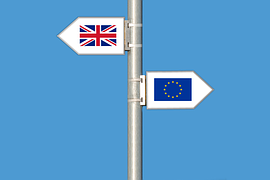 Early in the morning of the 24 June 2016 it was announced that, by a slim majority of 51.9% to 48.1% of the participating voters, the decision had been taken for the UK to leave the EU. While not legally binding on the UK government, this decision is politically binding and at this time clearly expected to result in the UK eventually ceasing to be an EU Member State.
Early in the morning of the 24 June 2016 it was announced that, by a slim majority of 51.9% to 48.1% of the participating voters, the decision had been taken for the UK to leave the EU. While not legally binding on the UK government, this decision is politically binding and at this time clearly expected to result in the UK eventually ceasing to be an EU Member State.
What happens now? For the UK to officially leave the EU, it has to notify the EU Council of its intention to do so. This triggers Article 50 of the EU Treaty, which provides for a maximum of two years for the withdrawal negotiations (extendable only upon agreement of all EU Member States). The notification is not thought to occur before October 2016, and as a result, the actual exit is unlikely to happen before October 2018. Until that time, the UK will continue to be an EU Member State, bound by EU treaties and laws.
How does this impact existing EU trademark and design rights? Nothing will change immediately. European Union trademarks (EUTMs) and Registered Community designs (RCDs) will still have effect in the UK until the effective exit date. What happens to these rights then will have to be determined by UK national legislation.
A likely scenario is for the UK to adopt some kind of “conversion” process by which EUTMs and RCDs that would otherwise lose their validity for the UK are allowed to be transformed into national UK rights maintaining their priority. This was – roughly speaking – how the countries that succeeded Yugoslavia dealt with former Yugoslavian rights. Whether this conversion should be automatic or on request only, resulting in loss of rights for right owners that do not engage in the process, is another question that would need to be resolved by UK national law. At this stage, nothing is certain. The Kluwer Trademark Blog will be monitoring and reporting developments as more information becomes available.
What steps or changes should be considered now? No immediate steps should be required with respect to existing portfolios. In particular, re-filing existing EUTMs as national UK marks would be premature. There are, however, recommendations for new filings and renewals. One should also start to think about the geographical requirements to use and reputation of trademark rights in the EU.
- New filings: Where protection is specifically required or desired for the UK, it is recommended to double up EUTMs and UK national filings for new filings.
- Renewal of UK national marks: UK national marks should be renewed at this time rather than relying on seniority claims raised for corresponding EUTMs.
- Use requirement for EUTMs: use made in the UK until the effective exit date should be able to sustain an EUTM. However, five years after the exit date (i.e. approximately from October 2023 onwards), EUTMs that are only used in the UK will be vulnerable to revocation due to non-use (in the EU). This is a rather long-term consequence and businesses interested in maintaining EU trademark rights have sufficient time to prepare and take up use of their brands outside the UK.
- Reputation of EUTMs: from the exit date onward, reputation of a trademark in the UK will not count towards reputation in the EU. Reputation evidence should therefore be collected with a view to that development, i.e. not focusing on the UK only.
Furthermore, over time, all existing agreements, license arrangements and undertakings will need to be reviewed to ensure that they continue to have their intended effect once the UK has left the EU. However, once again, there is plenty of time to do that.
For now, let us all just wait to see what happens on the political scene – both internally in the UK and then, eventually, in the course of the withdrawal negotiations and parallel legislation in the UK. If BREXIT should ultimately not happen – which is also under discussion – then all the better for everyone.
_____________________________
To make sure you do not miss out on regular updates from the Kluwer Trademark Blog, please subscribe here.


